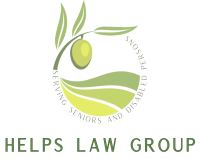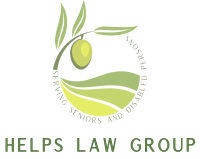HELPS Law Group
Frequently Asked Questions
We believe in fair and adequate access to legal information for senior citizens, veterans and disabled persons struggling with debt.
Who Does HELPS Help?
HELPS' clients are senior citizens, retired persons, veterans and legally disabled persons. HELPS clients receive incomes protected by federal and state laws. They struggle with debt they cannot afford to pay. Some of our clients find us after struggling with debt for years. Some of our clients find us when they have never missed a payment on a credit card, but changes in life have put them in a position where they can no longer pay the debt. For nearly ALL of our clients, there is no simply no money to pay the debt or doing so means sacrificing funds for medication, food or utilities.
How Much Does HELPS Cost?
We don’t turn anyone away that needs our help. The cost is normally less than a cheap cup of coffee a day. Many receive our help at no cost. You can read more about the cost of HELPS here.
How Do I Enroll in HELPS?
You call 855-435-7787 and speak to one of our paralegals or attorneys. We ask you questions designed to help us understand your situation. We do not pressure to you to enroll. We are here to provide callers with with information so they can make better decisions based on information and not fear. Some people contact us many times before they become our clients. We do not mind; HELPS' services are for persons receiving protected income who are struggling with unsecured debt they cannot afford to pay. This is not everyone. We want all potential clients to understand our services. Most of our clients enroll over the phone. We do not require you to fill out any forms before you become our client. We do require your ability and willingness to answer several basic questions like your name, and contact information information along with your sources of income and approximate amount of debt you owe. Enrollment requires no immediate payment of fees. All HELPS clients receive the first 30 days of our services for free.
What Does HELPS Do?
We provide legal representation for the receipt of debt collection calls as described by the Fair Debt Collection Practices Act, 15 U.S.C. 1692 et seq, often referred to as the "FDCPA". The FDCPA is federal law. It was created to protect consumers from debt collectors. HELPS uses 15 U.S.C. 1692(c), which protects people from unwanted debt collector contact. This law requires debt collectors deal directly with an attorney representing a person instead of the person his or herself, once it has received notice that an attorney has been retained for reprsentation regarding the matter.
What is a Debt Collector?
According to 15 U.S. Code § 1692(a), the term "debt collector" means any person who uses any instrumentality of interstate commerce or the mails in any business the principal purpose of which is the collection of any debts, or who regularly collects or attempts to collect, directly or indirectly, debts owed or due or asserted to be owed or due another. This term also includes any creditor who, in the process of collecting his own debts, uses any name other than his own which would indicate that a third person is collecting or attempting to collect such debts. For the purpose of section 1692f(6) of this title, such term also includes any person who uses any instrumentality of interstate commerce or the mails in any business the principal purpose of which is the enforcement of security interests.
Put into plain English, a debt collector is a person or company that collects a debt. Debt collectors are typically in business to collect debts assigned to them by creditors.
Put into plain English, a debt collector is a person or company that collects a debt. Debt collectors are typically in business to collect debts assigned to them by creditors.
If I Enroll in HELPS, Can I Keep My Bank Account?
If you owe the bank money, e.g. a credit card balance, and intend to include this debt in the list of debts you provide to HELPS, it is best to close any deposit accounts you have with the bank. If you do not owe your present bank money or you are not listing any amount owed to this bank with HELPS, you do not need to change your bank account.
What is the Fair Debt Collection Practices Act?
The Fair Debt Collection Practices Act (FDCPA) prohibits debt collectors from using abusive, unfair, or deceptive collection practices. The FDCPA does not apply to original creditors or those collecting business debts, unless it uses a third party name and collects on its own behalf. In addition to the FDCPA, many states have laws that proscribe unlawful debt collection practices by debt collectors and creditors.
Why Did a Bankruptcy Attorney Tell Me To File If I Have Protected Income and Assets?
The old saying "if all you have is a hammer, everything looks like a nail," probably applies here. Bankruptcy attorneys are used to dealing with debt problems with bankruptcy filings. This is how bankruptcy attorneys make their living.
Unfortunately, there are also some bankruptcy attorneys who do not fully understand the laws protecting incomes and assets outside of bankruptcy.
Unfortunately, there are also some bankruptcy attorneys who do not fully understand the laws protecting incomes and assets outside of bankruptcy.
Are Veterans Benefits Legally Protected? What About Benefits for Veterans' Spouses?
Veterans benefits of all types are protected from collection along with social security and other retirement income. In addition, HELPS routinely assists its veteran clients in making sure they are receiving the full amount of benefits to which they may be entitled. Many lower income veterans and spouses are entitled to supplemental veterans benefits. HELPS volunteers can assist in providing more information. Many widows of deceased veterans are entitled to supplemental benefits that they do not receive simply because of lack of knowledge.
What Do I Do About Feeling Guilty For Being Unable to Pay My Debt?
HELPS Clients typically find us after doing everything in their power to pay debt.
The law defines “guilt” as moral culpability for an intentionally committed or premeditated act. Hopefully, our choices are guided by principles beyond the law, but it is good to recognize the intent of this concept. Life does not always wind its way around the path of our intentions. The laws protecting Social Security benefits and retirement incomes exist to protect senior citizens from foregoing basic necessities. You have the right to survive.
If you owe money to a bank, it's also important to remember that many, many banks have been bailed out by the federal government (U.S tax dollars) multiple times. Here is a link to a consistently updated list of banks who have received money from the federal government: https://projects.propublica.org/bailout/list
Someone is not a “bad person” because he or she cannot afford to repay old debt. Lenders are businesses. Lenders know there may be circumstances when debtors cannot repay loans. When lenders loan money or give credit to consumers, they attach an interest rate to the loan. This interest rate exists not only to generate revenue for the business, but also to protect lenders from possible risks. They know there may be circumstances when debtors cannot repay loans. While many lenders seek to capitalize on guilt to persuade repayment, loans are contracts made with the implied understanding that performance – repayment of the loan – is objectively possible. Failure to repay outstanding credit or old debt is never a crime. Enforcement of these loans may be sought only through the civil courts. When the debtor is a senior citizen with minimal and/or exempt assets who has protected retirement income, any court judgment for collection of money owed is effectively powerless.
The law defines “guilt” as moral culpability for an intentionally committed or premeditated act. Hopefully, our choices are guided by principles beyond the law, but it is good to recognize the intent of this concept. Life does not always wind its way around the path of our intentions. The laws protecting Social Security benefits and retirement incomes exist to protect senior citizens from foregoing basic necessities. You have the right to survive.
If you owe money to a bank, it's also important to remember that many, many banks have been bailed out by the federal government (U.S tax dollars) multiple times. Here is a link to a consistently updated list of banks who have received money from the federal government: https://projects.propublica.org/bailout/list
Someone is not a “bad person” because he or she cannot afford to repay old debt. Lenders are businesses. Lenders know there may be circumstances when debtors cannot repay loans. When lenders loan money or give credit to consumers, they attach an interest rate to the loan. This interest rate exists not only to generate revenue for the business, but also to protect lenders from possible risks. They know there may be circumstances when debtors cannot repay loans. While many lenders seek to capitalize on guilt to persuade repayment, loans are contracts made with the implied understanding that performance – repayment of the loan – is objectively possible. Failure to repay outstanding credit or old debt is never a crime. Enforcement of these loans may be sought only through the civil courts. When the debtor is a senior citizen with minimal and/or exempt assets who has protected retirement income, any court judgment for collection of money owed is effectively powerless.
If I am a senior citizen with only legally protected income, can I still be sued for a debt?
Yes. A creditor or debt collector can still sue you for a breach of the original contract you signed when you incurred the debt you owe. It is very important to remember, however, a judgment resulting from a lawsuit for debt can only do two things - go after unprotected income and unprotected assets. Nearly all HELPS clients do not have either of these things. Most of the people we serve are judgment proof. We strongly encourage you to learn more about what it means to be sued for debt when you're a senior citizen or a legally disabled person.
Why Would A Company Sue Me If I am Judgment Proof?
Lawsuits can be very intimidating. Some senior citizens and legally disabled people who have been sued think they are in criminal trouble and may be arrested. Many more do not know about the laws protecting their retirement incomes from any judgments potentially resulting from a lawsuit for debt. Fear is often a debt collector's best friend.
If I Am Sued, Do I have to Go To Court?
Appearing in court and/or filing a response to a lawsuit is always your choice. It's important to remember lawsuits are filed in the civil justice system, not the criminal justice system. Being sued is not the same as being arrested. Owing a debt you cannot afford to pay does not make you a criminal. Responding to a lawsuit is never legally required, and you will not go to jail if you choose to not to do so.


